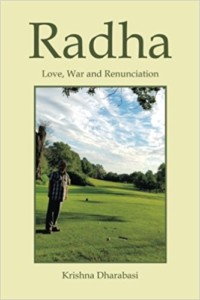 Title: Radha: Love, War, and Renunciation
Title: Radha: Love, War, and Renunciation
Author: Krishna Dharabasi
Publisher: XlibrisUS
ISBN: 9781543470109
Genre: Fiction
Pages: 354
Reviewed by: Susan Milam
Pacific Book Review
Radha, written by Krishna Dharabasi and translated from Nepali by Mahesh Paudyal, purports to be the memoir of Radha, the first and true love of Lord Krishna. The book departs from the standard Krishna fable in two important ways: first, by retelling it from a woman’s point of view; and second, by moving the story out of the realm of myth and into a more realistic setting. Much of the source material for Radha is derived from the Mahabharat, an ancient epic poem. It may take a few pages for readers who are unfamiliar with Radha and Krishna’s love story to get into the flow of the book. However, thanks to Mr. Paudyal’s enlightening introduction and his riveting translation, even those who are new to the myth will soon find themselves drawn into the story.
The book opens with the discovery of an ancient manuscript. After some time spent finding a person who can decipher the document, the story of Radha and Krishna begins. The tale of Krishna is a seminal Hindu myth, and many readers will know the basic story. Still, Radha’s diary quickly diverges from the myth’s portrait of Krishna as a divine being. He and Radha operate in a world that is as realistic as it can be while still operating within the myth’s overall framework. With Radha as a guide through this world, the relationships and the myth itself take on an entirely new perspective. Throughout her writings, Radha points out the ways in which society treats women poorly, and that many times, women are complicit in the treatment they and other women receive. Additionally, despite being in love with Krishna since they were children, she points out Krishna’s faults and takes issue with the way he is brought up as the presumptive ruler. At times, she commiserates with his wives, whom he treats disrespectfully. Thus, seen through Radha’s eyes, Krishna becomes human and his divinity falls by the wayside. Radha emerges as a woman who is strong enough to carve out a life for herself while Krishna continuously reneges on promises to return to her.
Many readers have characterized Radha as feminist, but Mr. Paudyal believes that the book belongs to “a Nepali school of critical thinking” that “claims life is a leela – a play of illusions – as is the life of Krishna himself.” Mr. Paudyal refers to the book’s deconstruction of the Krishna myth. While conforming to many of the standard Krishna storylines, the text subtly calls those storylines into question through its feminine perspective, its sly language and its upending of the myth’s conventions. Much of this understated subterfuge will be recognized immediately by those with knowledge of the Mahabharat, while those who are new to this world may need to acquaint themselves with the original myth.
Radha is a complex book, which will challenge readers on many levels. People who are conversant with the Krishna myth are called upon to view it in a new way. People unacquainted with the Krishna myth are called upon to enter a world that may be superficially alien to their life experiences. However, dedicated readers will discover a universality to the story that transcends the specific, and a narrative that calls into question the line between reality and illusion.

